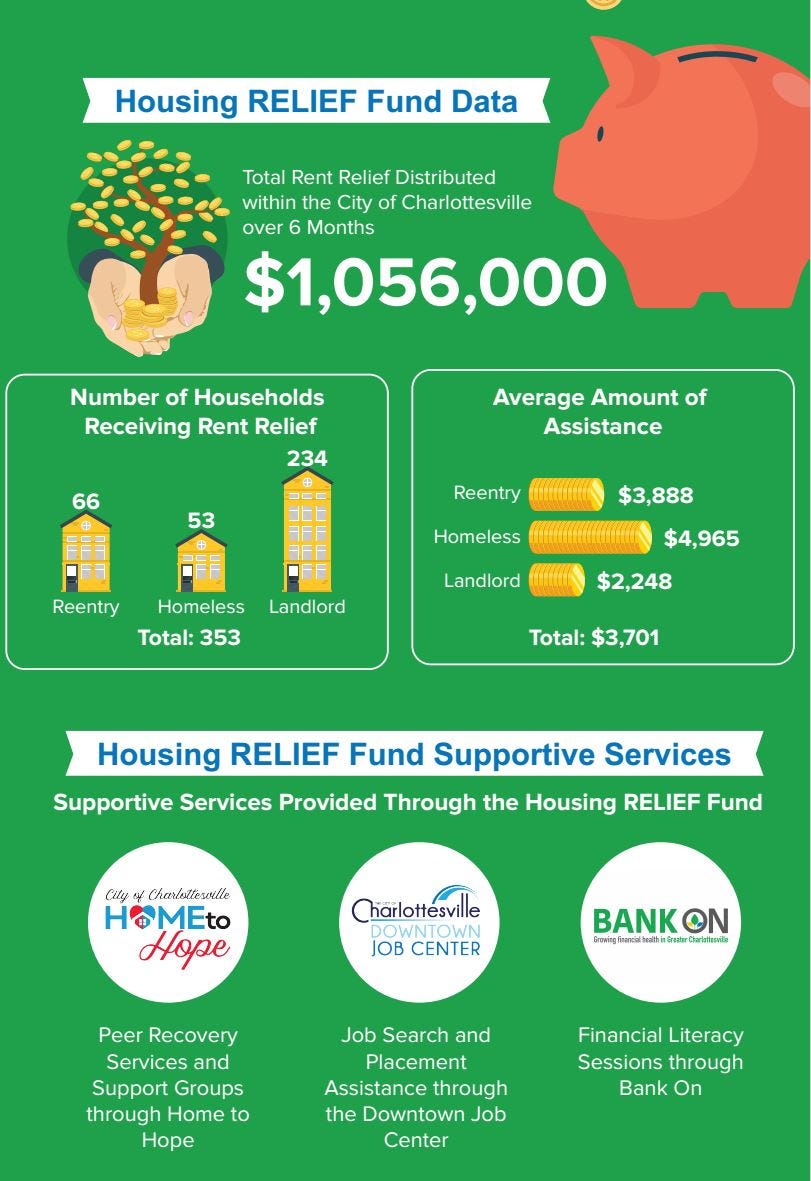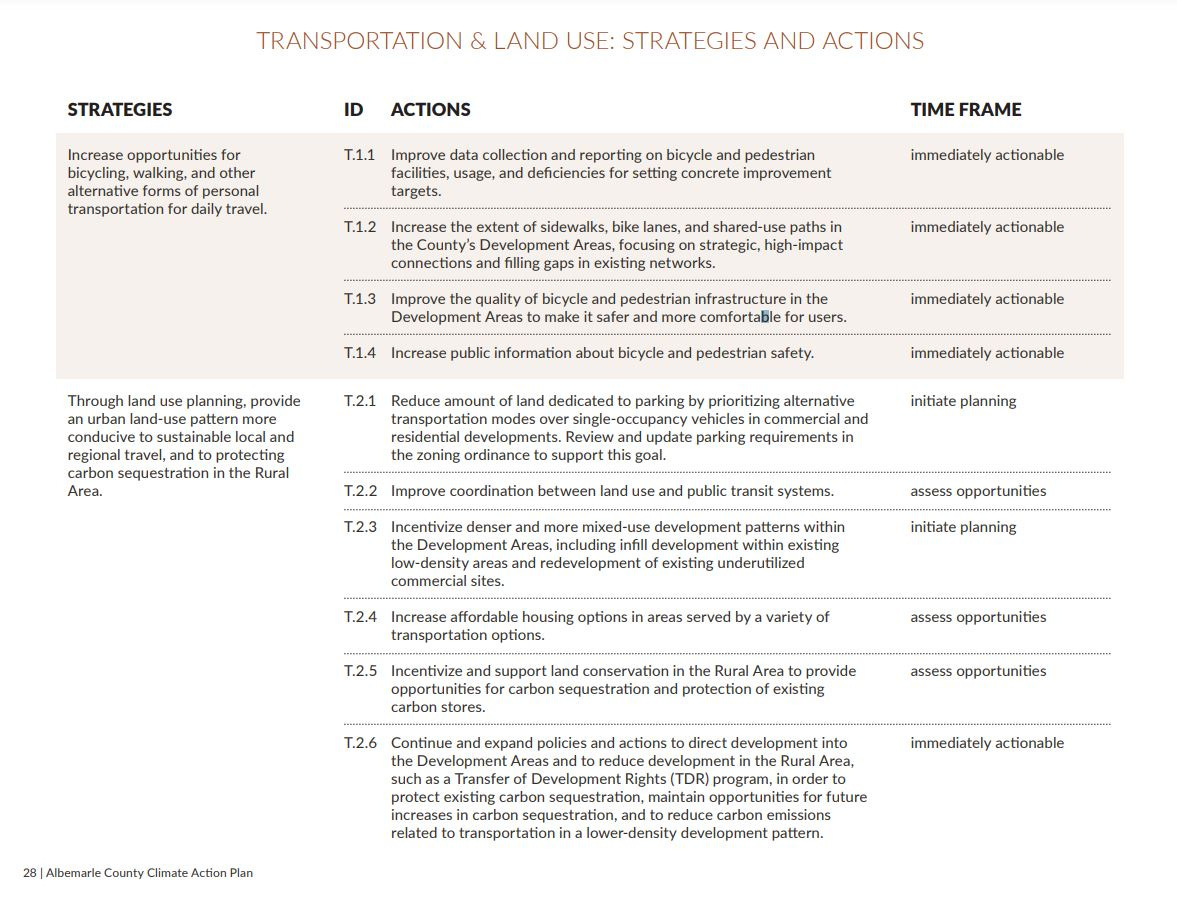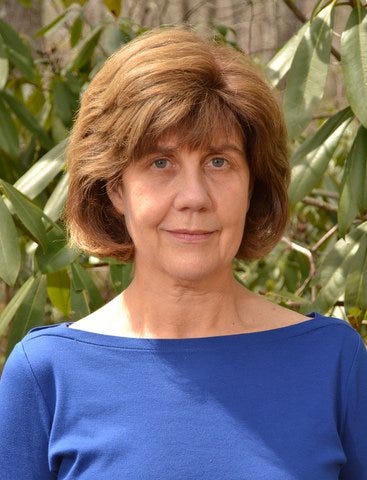Today's Patreon-fueled shout-out is for the Plant Northern Piedmont Natives Campaign, an initiative that wants you to grow native plants in yards, farms, public spaces and gardens in the northern Piedmont. Native plants provide habitat, food sources for wildlife, ecosystem resiliency in the face of climate change, and clean water. Start at the Plant Northern Piedmont Natives Facebook page and tell them Lonnie Murray sent you!
On today’s show:
Charlottesville’s Planning Commission was briefed last week on the affordable housing plan under development
There will be one new member of the Albemarle Supervisors next January
Albemarle’s greenhouse gas emissions inventory nearing completion
Charlottesville hands out $1 million in rental relief
Another banner year for conservation easements in the Northern Piedmont region
There will be at least one new person on the Albemarle Board of Supervisors when they convene for the first time in 2022. Supervisor Liz Palmer told members of the Albemarle County Democratic Party on Friday she will step down as the Samuel Miller District when her second term ends in December. Palmer was elected in 2013 when she defeated Republican Duane Snow, and defeated Republican John Lowry in 2017. No candidates have yet filed paperwork to run in the district, which covers southwest Albemarle County.
Both the Jack Jouett District and Rio District are also up for election this year. Neither Diantha McKeel or Ned Gallaway have announced their intentions. McKeel is in the final year of her second term and Gallaway is finishing his first.
Affordable housing in Charlottesville
This afternoon, Charlottesville City Council will get an update on the creation of an affordable housing plan that is at the heart of the ongoing Comprehensive Plan review. Last week, the Planning Commission was presented with a revised plan from officials with Rhodeside & Harwell and subcontractor HR&A Advisors. (revised plan)
“We had the draft plan that was available for public input,” said Sarah Kirk with HR&A. “We conducted a lot of engagement around that.”
Kirk said many changes were made to the language of the plan to make sure the words line up with its intent of bridging the “sizable affordable housing gap” while also addressing “historical patterns of segregation [that] persist throughout the City.”
“There were some places where the intent of the language that was being used or the intent of the recommendations weren’t really clear,” Kirk said. “So what we’ve really done is we’ve clarified language to make sure that we’re being explicit about what the recommendation is and how it will be implemented by the city.”
They’ve also added more information about tools to expand homeownership in the city.
“In addition we’ve added some additional detail about how the plan conserves vulnerable populations as well as address energy costs as part of housing affordability,” Kirk said.
The consultants also added more details on the recommendation for the city to invest $10 million a year in affordable housing.
“Really it’s $7 million of direct subsidy, most of it would be going through either the [Charlottesville Affordable Housing Fund] or other allocations,” Kirk said. “$2 million of that is for tax relief which the city has already allocated. The city does needs to be spending funds on administration of these various housing programs and so we wanted to capture that here.”
Kirk said the document more clearly acknowledges existing projects already funded, including investments in redevelopment of city’s public housing sites and the redevelopment by Piedmont Housing Alliance of Friendship Court. There’s also a new section on how all of these ideas would be implemented. You can watch her presentation on the city’s Boxcast channel.
Council gets the report at 4 p.m. and will discuss the matter further at their meeting on March 1. The Cville Plans Together Initiative will meet with the Planning Commission again on February 23 with a discussion of a draft future land use map. Hosea Mitchell is chair of the Planning Commission.
“This is going to be a pretty critical meeting because this is where things fell apart before,” Mitchell said. “I’m hoping that you guys can get us over this huge speed bump.”
Also tonight, Council will be asked to give direction on the West Main Streetscape, a question that has been posed to them at multiple meetings over the years. For more on Council’s meeting tonight, check out the most recent installment of the Week Ahead newsletter. (the link)
Just before today’s newsletter was about to be produced, the City of Charlottesville sent out a press release announcing that the city’s Office of Economic Development disbursed $1 million in rent relief between last July and this January. The source of the money was the Charlottesville Affordable Housing Fund. A total of 353 households received funding with an average of $3,701 per household. (press release)

Climate action
Albemarle County is moving forward with the next phase of a Climate Action Plan. The Board of Supervisors adopted the plan last October. Greg Harper of the county’s Facilities and Environmental Services Department updated the Places29-Hydraulic Community Advisory Committee.
“The Board did not want us to develop a paper document and put it on the shelf as they say,” Harper said. “They want a climate program and I think this was just the beginning of what is going to be a long-term, long-time program.”
Addressing climate change is one of Board’s strategic goals, which means programs to implement the plan’s objective to hit certain emissions reductions goals are likely to be funded.
“We’re supposed to have community emissions reduced by 45 percent [by 2030] and then by 2050 we should be achieving net zero emissions,” Harper said. “That means for all the emissions emits, carbon emissions and other greenhouse gases, we’re supposed to sequester or absorb an equal amount of emissions so that the net is zero. That’s basically what that means.”
Harper said the climate action plan is a set of strategies and actions that can be taken across multiple sectors to reduce the overall.
“There are 11 goals in the five sector categories,” Harper said. “Those broad goals are supported by 31 strategies and those 31 strategies are supported by 135 separate actions in the plan.”
Harper said the county is now moving into Phase 2 which includes an update of a greenhouse gas emissions inventory. Such work has not been done in over a decade.
“And it’s nearly complete, so I would be on the lookout in the next couple of months for 2018 greenhouse gas inventory for Albemarle County,” Harper said. “And it’s 2018 because we can’t do 2020 because we won’t have the data for 2020 for a couple of years unfortunately.”
Harper said the Climate Action Plan is intended to build on other county documents, including the Comprehensive Plan. For the full presentation, watch this portion of the Places29-Hydraulic meeting on the Albemarle County YouTube page.

A nonprofit group is celebrating another banner year for land conservation. The Piedmont Environmental Council has announced the placement of 5,287 acres of land in its nine-county region in 2020. That includes easements held by PEC as well as the Virginia Outdoors Foundation, local and state governments, and other land trusts.
“Every acre of protected land is land that helps prevent water pollution, preserve natural flood controls, promote groundwater recharge, and support local agriculture and carbon sequestration,” said Chris Miller, president of The Piedmont Environmental Council in a press release.
This year’s totals includes acquisition by the Albemarle County Easement Authority of 1,150 acres of land near Morven Farm. In all, over 2,000 acres in Albemarle added conservation easements last year. You can download more info from here to learn more about what happened in each of their counties.
Disclaimer: PEC is one of the sponsors of Town Crier Productions and I worked for them for a two-year period before launching this business to support my return to journalism. They have no editorial input in this or any other newsletter and I welcome their support.
Speaking of the Virginia Outdoors Foundation. They have awarded the Town of Scottsville an $80,000 preservation grant to help purchase 14.2 acres of wetlands for a future park. The goal is eventually to add walking trails in the area to expand the network in West Downtown. The VOF awarded the Nelson County Parks and Recreation Department $60,000 to create the first public access boat launch on the Rockfish River. For a full list of localities and organizations that will receive an award, visit the VOF’s website.
















Share this post